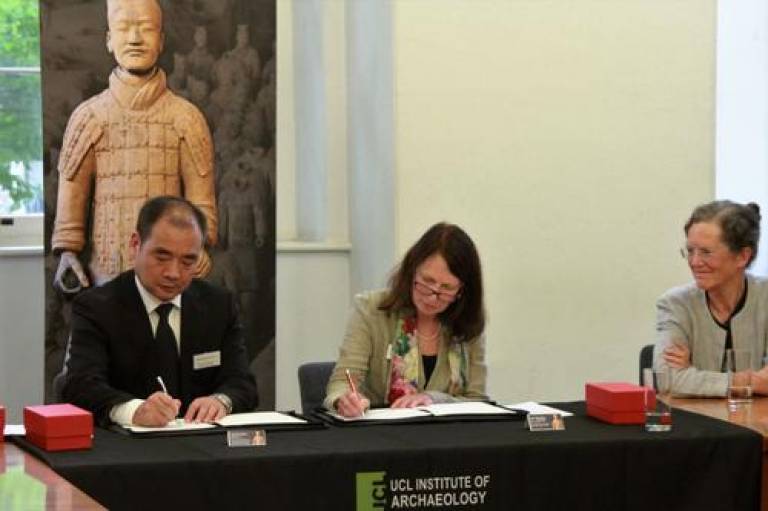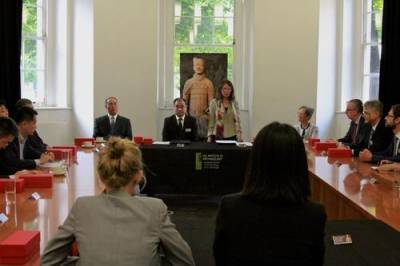Terracotta Army collaboration renewed!
21 September 2016
We are very pleased to report that the collaboration between UCL and Qin Shihuang's Mausoleum Site Museum keeps getting stronger.

The UCL Institute of Archaeology and the Emperor Qin Shihuang's Mausoleum
Site Museum in Lintong, Xi'an,
China, have recently renewed their collaborative agreement at a signing
ceremony at UCL. The renewed collaboration agreement has been sanctioned by the
Chinese State Administration of Cultural Heritage, and adopted formally as a
British Academy Project, hence receiving institutional endorsement at the
highest level in both China and the UK. The collaboration started in 2006 and
has led to numerous research, training and knowledge exchange visits between
both institutions, as materialised in numerous publications in several
languages and a wide range of public engagement activities.
The Museum Director, Hou Ningbin, and Professor Sue Hamilton, Director of the UCL Institute of Archaeology, sign the agreement under the gaze of Prof Mary Fulbrook, Dean of the UCL Faculty of Social and Historical Sciences.
The project "Imperial Logistics: The Making of the
Terracotta Army" seeks to understand the crafting methods and logistical
organisation behind the creation of the famous Terracotta Army and the broader
mausoleum constructed in the 3rd century BC for China's first
emperor. The work centred on this World Heritage site has capitalised on the
synergic strengths of both partner institutions, incorporating scientific
approaches such as archaeometallurgy, ceramic analysis, geometric morphometrics
and spatial statistics. The multinational team has revealed that the workforce
that built the Terracotta Army 2,200 years ago was organised in production
cells that worked in parallel, in addition to providing insight into many other
aspects of how people, materials and knowledge were orchestrated to make this
unique construction possible.

A moment of the signing ceremony.
Attendees to the signing ceremony in London included Rong Zhao (Director of the Shaanxi Administration of Cultural Heritage), Ningbin Hou (Director of the Museum), Weiling Wang (Director of the Shaanxi Provincial Institute of Archaeology), as well as UCL's Anthony Smith (Vice-Provost for Education), Mary Fulbrook (Dean of the Faculty of Social and Historical Sciences), Sue Hamilton (Director of the UCL Institute of Archaeology) and Thilo Rehren (Professor of Archaeological Materials and Technologies), among several others from both partner institutions. Other guests included Jiang Sunan (Minister Counselor for Science and Technology at the Chinese Embassy in the UK) and representatives from Rio Tinto, the Institute for Archaeo-Metallurgical Studies and the British Academy, who sponsor the project.
Marcos Martinón-Torres is Professor of Archaeological Science at the UCL Institute of Archaeology and the Director of the Imperial Logistics Project.
 Close
Close

